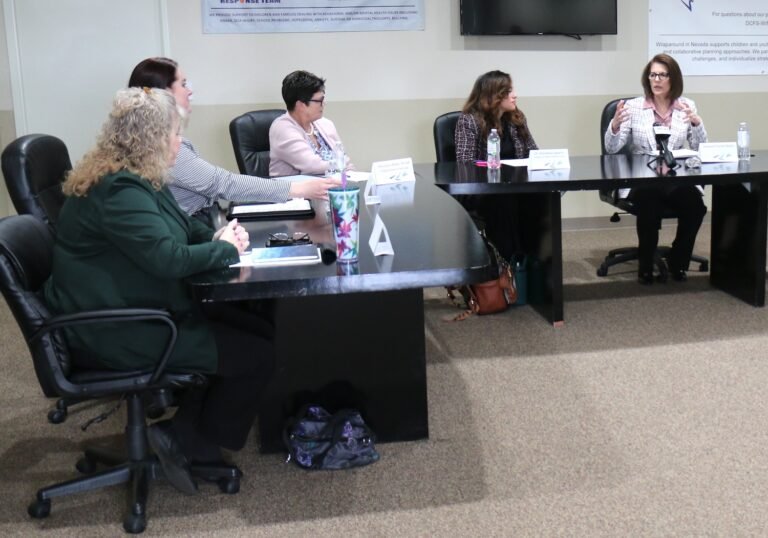Nevada Sen. Catherine Cortez Masto met with local mental health advocates on the front lines in Reno on February 15 to learn how to widen the gateway between funding and crisis treatment services. .
Cortez Masto will host a roundtable discussion to discuss what else can be done to secure federal funding to better integrate the mental and behavioral health needs of Nevadans in need of immediate assistance. Asked. Democrats said their goal is to find legal solutions for families and children and expand Medicare and Medicaid providers and services through mobile crisis response teams.
“For me, growing up in this community, how do we make sure that families and children get the services they need based on the issues they’re facing?” Cortez Masto said. .
Roundtable panelists included Dr. Antonina Capullo, a medical epidemiologist with the Nevada Department of Health and Human Services Division of Children and Family Services. Capullo said DCFS oversees mobile crisis response teams that provide life-saving support services.
“We support families of youth under the age of 18 and have a dynamic program in place,” Capullo said. “Our goal is to help people unite with their families and provide a truly supportive environment for recovery. Emergency room visit rates have decreased by 83%.”
Once response teams are successful in keeping young people out of the emergency room, she said, the team’s next steps are to identify community resources and connect families with long-term services.
“That’s where we struggle as a team,” Capullo said.
There are new models, such as intensive crisis stabilization services and strategies to bring telemedicine to rural areas, but how to implement them is another question. Cortez Masto said another challenge has been calls from families dealing with the aftermath of the pandemic, including depression and anxiety.
In February 2021, Cortez Masto, along with Senate Finance Committee Chairman Ron Wyden (D-Oregon) and six other members, introduced the Off-the-Street Crisis Assistance Assistance (CAHOOTS) Act. This bill provides enhanced Medicaid funding for three years. People with mental health or substance use disorders. The bill would provide $25 million in grants and evaluations to help states deploy mobile crisis response teams that can be called in place of law enforcement.
Cortez Masto also supported the implementation of the 988 Suicide and Crisis Lifeline and advocated for $1 billion in support for school mental health services in the bipartisan Safer Communities Act.
She said it wasn’t enough.
“You are the starting point for my bill,” she told the speakers. “What else do I have to do? I can fight for a federal budget, I can fight to pass a bill, but if there’s no law, I’m going to give other states that budget.” But where else should we go?”
Organizations such as the National Alliance on Mental Illness, which educate the public and support research funding, are among the leading resources, speakers said. Kathryn “Katie” Rosaci, Clinical Program Manager II, who oversees the Nevada Wraparound Program for the DHHS Division of Children and Family Services, says it’s important to personalize services to each person’s needs, which is why mobile support is key. I said it was important.
“What we know about children’s mental health is that it’s not just about one family member,” she says. “And we’re learning their values, their culture, and things that are unique to them.”
Cortez Masto asked about system gaps and challenges for employees looking to expand mobile crisis response services. For many families, especially those living in rural counties with few services, transportation is a barrier to accessing the help they need in making appointments, said Sherilyn Larwood, community behavioral health coordinator for NAMI Western Nevada. He said it was a big barrier.
“We know we’re not going to put a provider in their neck of the woods,” Larwood said. “We have a lot of teams working, and it can take them two hours to get a call, so how do we get those teams out there? There’s going to be a shortage (of workers). Internships are great and we’re building a pipeline of talent. There are a few things we’re looking at. We really want to cover all age groups. I am.”
Cortez Masto said after the roundtable that it is also important to recognize the challenges in reaching multicultural populations, such as Latino communities who do not speak English and need doctors.
“Nevada is beautiful and diverse,” she said. “We have the fastest growing (Asian American/Pacific Islander) community and we need to interact with these communities and reach them where they are.”
Larwood cited the need to increase interest for those who want to pursue counseling, psychology or related fields. She mentioned NAMI’s Nevada Teen Peer Support Text Line. This line allows anyone under the age of 24 with mental illness or other life issues to text her to 775-296-8336.
“We just need the funds,” she said. “We received a huge grant from Helmsley (a charitable trust) and that’s how Teen Textline was built.”
Cortez Masto said collaboration is key for communities to provide services to families with mental health issues. She said funding from the bipartisan Safer Communities Act helped hire school counselors to serve as a bridge between schools and outside services and strengthen community awareness.
“Education is always the first step in prevention and connecting people to services, and we need to continue to do that,” she said.


